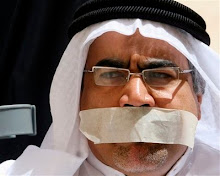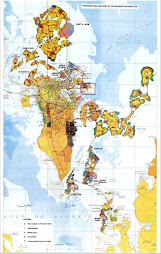Bush Nudges Mideast on Democracy
Dissidents Skeptical, Saying U.S. Has Overlooked Abuses
By Michael Abramowitz
Washington Post Staff Writer
Monday, January 14, 2008; A15
ABU DHABI, United Arab Emirates, Jan. 13 --
Shortly before President Bush showed up in the region last week, human rights activist Abduljalil Alsingace tried to deliver a petition to the U.S. Embassy complaining about the lack of democracy in his native Bahrain. He thought he might have some hope, given the strong language coming from the White House on the need for political reform in the Middle East.
But as he tells it, the U.S. Embassy was cool to his plans to deliver a petition, accepting his document only grudgingly after several days of negotiations. Then he was astounded to hear Bush's description of Bahrain as an example of positive democratic reform. "All the wealth and power are with the royal family," Alsingace said in an interview.
Adam Ereli, the U.S. ambassador in Bahrain, disputed Alsingace's account, saying the embassy was happy to accept the petition and sees its job as listening to "all sides of the political spectrum."
Still, the episode underscores the sharp disappointment with Bush among democracy advocates and dissidents in the region, who were buoyed by Bush's clarion call in 2005 for freedom and democracy in the Middle East. They say the White House has backtracked because of a need to cultivate an alliance against Iran with the region's autocratic leaders and, perhaps, because elections in the Palestinian territories did not go the way it had wanted.
Bush is placing the promotion of democracy and freedom at the top of his agenda as he makes his way through his first extended tour of the Middle East during his presidency. At every stop, from Jerusalem and Ramallah to Bahrain, Kuwait and the United Arab Emirates, Bush has discussed the issue, although he has done so with politeness and courtesy to his hosts in a region where most of the countries practice some form of monarchy, or rule of one.
Aides said he plans to raise the issue again when he travels to Saudi Arabia on Monday and then to Egypt, considered by many democracy activists to be among the most repressive governments in the Middle East.
Previewing the message to Saudi Arabia, where the royal family wields near-absolute power, a senior administration official appeared to suggest that Bush would step cautiously in discussing reform issues. Speaking on background under White House rules, the official said the administration is taking heart in incremental steps, such as municipal elections.
"This is a conservative society, and it is moving at a pace that King Abdullah believes is appropriate to that society," the official said. "But he's a man who thinks deeply about the future of his country and I think understands that it needs to change."
On Sunday in Abu Dhabi, capital of the United Arab Emirates, Bush delivered what aides described as the centerpiece speech of his eight-day trip to the region, describing the promotion of freedom as a key pillar of
U.S. foreign policy and asserting that "stability can only come through a free and just Middle East."
Bush said he believed that leaders in the region were beginning to respond to this call, citing parliamentary elections in Bahrain, Morocco and Jordan, as well as Kuwait, the country's first in which women were allowed to vote.
He acknowledged setbacks, although he singled out no country for criticism. He appeared to have Egypt in mind when he said: "You cannot build trust when you hold an election where opposition candidates find themselves harassed or in prison. You cannot expect people to believe in the promise of a better future when they are jailed for peacefully petitioning their government."
The reaction in the region to Bush's speech appeared at best mixed, if cynical in some quarters, owing to a widespread belief that the president has practiced a double standard in refusing to recognize Hamas, the armed Islamic movement that won free elections in the Palestinian territories before seizing power in the Gaza Strip last summer. The U.S. government considers Hamas a terrorist group.
Many activists, meanwhile, say they believe the White House has flinched from aggressively challenging Egyptian President
Hosni Mubarak. In 2005, Secretary of State Condoleezza Rice canceled a visit to Cairo after the government arrested opposition leader Ayman Nour. Egypt released Nour shortly afterward.
But the activists say the White House hardly responded to presidential balloting in 2005 that gave Mubarak nearly 90 percent of the vote but was marked by serious allegations of election abuse and harassment of opposition figures. Nour, meanwhile, has been imprisoned again.
Oraib al-Rantawi, director of the Al-Quds Center for Political Studies in Amman, Jordan, said reformers have lost faith in the White House, while governments in the region believe they can crack down on the opposition without fear of a stern reaction from the administration.
"Nobody believes anymore what Mr. Bush is saying," he said.
Others gave a less scathing assessment. Saeed al-Marouei, 27, an associate at a development firm who attended the speech Sunday afternoon in Abu Dhabi, said that he believed Bush was sincere and that he agreed with some of what Bush said.
But he voiced doubt that Bush's words on democracy would resonate in the region. "You can't expect nations to do things they don't want to do," he said. "We need at least 50 to 80 years to achieve true democracy. But it will not happen overnight."
As he tours the region, Bush has been careful to note that freedom and democracy may take different forms, not all of which will look like an American-style system. He has also praised several of the rulers he has met: At a roundtable discussion on democracy Saturday with leading Kuwaiti women, Bush noted that the emir had told him he did not regret allowing women to vote.
During a stately arrival ceremony Saturday at Sakhir Palace in Bahrain, Bush praised King Hamad bin Isa al-Khalifa for holding two elections since 2000 and noted that in 2006, a woman was elected to parliament for the first time. Activists complain that the parliament is manipulated by the royal family and say the government discriminates against the country's Shiite majority.
"Your Majesty," Bush said, "I appreciate the fact that you're on the forefront of providing hope for people through democracy."
How leaders in the region are reacting to Bush's message, however politely delivered, is far from clear. Before his trip, a senior administration official predicted it would not go down well in some countries.
White House press secretary
Dana Perino, who has sat in on some of the president's meetings, said she believed his message is being well-received. "The idea of more openness is one they have told the president they recognize will help them in the future," she said Sunday.
Carl Gershman, president of the National Endowment for Democracy, said the Middle East is the most difficult place in the world to advance democracy. "Bush had a lot to do with unleashing a debate in the region," he said. "Even when he appears to be retreating from the agenda, he is contributing to the debate."
Correspondent Ellen Knickmeyer in Cairo contributed to this report.







